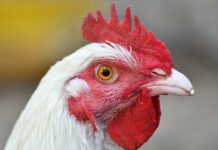By SANDRA D. SMITH
We are on the downhill stretch. Mornings and nights are still cold, but the sun is warming up our afternoons.
We are all waiting for the weather to stay above 50 degrees and for the grass to turn green and start growing. Once it reaches the right height, we can stop feeding hay and get livestock we have been feeding all winter out onto that forage pasture.
Then we tend to take a little vacation and not worry so much because the animals have grass and are feeding themselves. But now is also the time to come up with a plan to control the weeds that seem to appear in our pastures when we aren’t looking.
Waiting too long
We tend to not do anything about weeds until they are way out of control and rapidly reproducing. Weeds can not only reduce the stored life of forage plants in pastures and hay fields, but also the quantity of the desirable plants in our fields.
Weeds are more aggressive as a whole than the desired or existing forages. They compete against these grasses for light, water and soil nutrients. Weeds diminish the palatability and quality of the forage for livestock production and some weeds are poisonous to livestock. Therefore, we need to plan ahead and come up with a weed management plan to reduce the negative impacts of weeds on forage production.
A large stand of weeds in a pasture or hay field can reduce yields and production practices such as overgrazing and low soil fertility levels tend to result in weed growth.
The ideal management plan incorporates practices that are adaptable to the growth of the desired forage species and less favorable for weeds. There are exceptions, but most weeds do not compete well with a dense stand of desirable grasses. Pastures and hay fields should be managed for vigorous growth of the desired forage grasses.
Tips
Effective weed control in pasture and hay field management plans includes:
- Maintaining proper soil pH and soil fertility levels. Soil testing is important to make sure you are replacing the nutrients removed by grazing and harvesting to maintain the desired forage stand.
- Being able to correctly identify the problem weeds and understand their life cycle so that you know that best time to control it.
- Rotating livestock so that pastures are not overgrazed. Grazing with multi species, such as sheep and goats, can help control some weed species.
- Repeated mowing can reduce weeds and provide some control, especially if weeds are mowed before they go to seed. Mow fields at the proper time and stage of forage maturity.
- Clean harvesting and mowing equipment between fields. Watch cutting heights for hay fields and do not harvest from Sept. 10 to Oct. 20 to allow desired forages to build up reserves going into winter.
- Allowing new forage seedlings to become well established before use and renovate pastures when needs.
- Herbicides are another useful practice for weed management in pastures and hay fields. But make sure you read and follow the directions. While herbicides are great at getting rid of broadleaf weeds they also kill desirable broadleaf plants that we want.
The label may also contain restrictions for harvest or grazing after application.
Worthy foe
Weeds have a high reproductive capacity and are able to produce thousands of seeds per plant and many species are capable of being viable in the soil for many years. So developing a weed management plan for pastures and hay fields that include ways for preventing weeds from going to seed is very important.
Take the calendar and mark days during the summer and early fall to observe what is going on in your pastures and hay fields and take preventative measures against weeds if needed.
(Sandra D. Smith is an Agriculture and Natural Resources Educator at OSU Extension, Carroll County. Send questions or comments in c/o Farm and Dairy, P.O. Box 38, Salem, OH 44460.)












